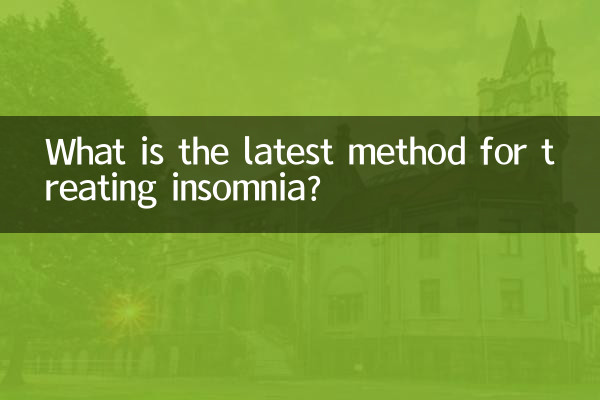What is the latest method for treating insomnia?
Insomnia is one of the common health problems of modern people. In recent years, with the advancement of medicine and technology, insomnia treatment methods have been constantly updated. This article will combine the hot topics and hot content on the Internet in the past 10 days to sort out the latest insomnia treatment methods for you, and provide structured data for reference.
1. The latest treatment methods for insomnia

1.Cognitive behavioral therapy (CBT-I): CBT-I is currently an internationally recognized first-line treatment for insomnia. It improves sleep quality by adjusting patients' sleeping habits and misperceptions. Recent research has found that online CBT-I courses are as effective as traditional face-to-face therapy and are more convenient.
2.light therapy: Use blue light or red light of specific wavelengths to adjust the body's biological clock, especially suitable for insomnia caused by circadian rhythm disorders. The latest research shows that 30 minutes of blue light exposure in the morning can significantly improve sleep quality.
3.digital therapy: Sleep assistance APPs and wearable devices based on artificial intelligence have become a new trend. These devices monitor sleep data and provide personalized improvement suggestions.
4.new drugs: Dual orexin receptor antagonists (such as Suvorexan) are new insomnia drugs approved in recent years and are less addictive than traditional sleeping pills.
5.neuromodulation technology: Non-invasive brain stimulation technologies such as transcranial magnetic stimulation (TMS) and transcranial direct current stimulation (tDCS) are beginning to be used in the treatment of refractory insomnia.
2. Data related to recent popular insomnia treatments
| Treatment | efficient | side effects | Applicable people |
|---|---|---|---|
| CBT-I | 70-80% | Very rarely | Various types of insomnia patients |
| light therapy | 60-70% | slight eye fatigue | People with circadian rhythm disorders |
| Dual orexin receptor antagonist | 65-75% | slight dizziness | Moderate to severe insomnia |
| digital therapy | 50-60% | None | mild insomnia |
3. Lifestyle suggestions for improving insomnia
1.Regular schedule: Set a fixed wake-up time every day, including weekends, to help establish a stable biological clock.
2.Limit activities in bed: The bed should only be used for sleeping and sexual life. Avoid working, playing with mobile phones, etc. on the bed.
3.Control caffeine intake: Avoid caffeinated drinks after 2 p.m.
4.moderate exercise: Regular aerobic exercise helps improve sleep, but avoid strenuous exercise 3 hours before going to bed.
5.relaxation techniques: Practice techniques like meditation, deep breathing, or progressive muscle relaxation before bed.
4. New trends in insomnia treatment
1.personalized treatment: Personalized insomnia treatment plans based on genetic testing and microbiome analysis are under development.
2.virtual reality technology: VR-assisted relaxation training has begun to be used in insomnia treatment, helping patients relax through an immersive experience.
3.Intestinal flora regulation: The latest research shows that intestinal microbial balance is closely related to sleep quality, and probiotic therapy may become a new treatment direction.
4.Telemedicine: The rapid development of telemedicine during the epidemic has enabled more insomnia patients to receive professional help.
5. Expert advice
Sleep medicine experts suggest that insomnia treatment should adopt a step-by-step approach: first try behavior change and cognitive behavioral therapy, and then consider medication if the effect is not good. It is also emphasized that short-term insomnia (less than 3 months) should be intervened as soon as possible to avoid developing into chronic insomnia.
It is worth noting that about 30% of "insomnia" is actually caused by other diseases (such as depression, thyroid dysfunction, etc.), so a comprehensive physical examination is particularly important for patients with refractory insomnia.
Finally, we need to remind you that any insomnia treatment method should be carried out under the guidance of a professional doctor, and avoid self-medication or trying unproven "recipes".

check the details

check the details